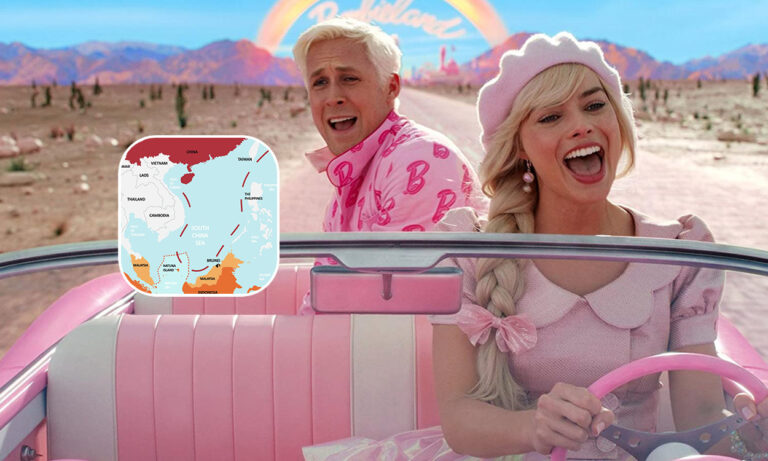Barbie movie ban: Why Hollywood is constantly bending the knee to China

To say that the internet is excited for the upcoming Barbie film would be a serious understatement. In part, this has been thanks to a very clever marketing campaign that saw the Barbie mansion listed on AirBnB and the iconic Margot Robbie all over the cover of Vogue talking about her experience in the film. Oh, and special mention goes to the strength of Ryan Gosling’s dedicated fan base pushing memes of the actor—set to play Ken in the upcoming film—harder than ever.
Despite the positive buzz surrounding the film, it has recently been revealed that Barbie will be banned in Vietnam due to the inclusion of a map that uses the controversial “nine-dash line,” a symbol that represents an area in the South China Sea that China claims as its own territory.
News 🖇️| #BarbieMovie got banned in Vietnam.
— CineFiles (@CineFiles_) July 3, 2023
A scene in the film depicts a map with the “nine dash line,” a representation of China’s territorial claims in the South China Sea, which Vietnam says violates its sovereignty.
Source (@Variety) pic.twitter.com/Efs7aBbg5r
The inclusion of a map that infringes on territory claimed by multiple nations in Asia could be interpreted as a small oversight by producers, but ensuring the film can release in the global eastern superpower has long been a Hollywood priority. Barbie is due to come out there on 21 July 2023, the same day as the US. Is this Hollywood’s attempt at rekindling its love affair with China?
Why does Hollywood cater so much to Chinese audiences?
So, why does Hollywood so often cater to overseas audiences, by choosing to overlook questions of sovereignty and oppression? There’s a simple answer: Money, and lots of it. Although it may have seemed like Hollywood films showing in China were slowing down, a post-pandemic need to boost spending has brought back the foothold that Hollywood has been growing throughout the 21st century.
To put into perspective how much extra money is made overseas, in 2019 Hollywood films showing in China made $2.8 billion. While the number went down during the COVID-19 pandemic, it remains clear that China is a lucrative market for the West.
The only catch? Censor your films for Chinese Communist Party (CCP) approval. China is notorious for cutting black stars from posters, and for removing scenes that they deem go against Chinese morals and values.
Given the strength of the Chinese audience, it makes sense that Hollywood would sacrifice its so-called morals to maximise profits on films that routinely cost hundreds of millions to make. Everyone involved gets to walk away with a whole lot more money if these films are as ready as they can be for the CCP, with Hollywood more often than not opting to avoid points of contention and strife between the superpowers, even before a Chinese censor has had a peek at the film.
Businesses in the Asian country are also limited by how much they can make off of media within their own territory thanks to strict government regulations, so it ends up being a win/win scenario for everyone involved.
Films that made dramatic changes for the Chinese market
One of the most egregious examples of Chinese censorship of Hollywood films was the sidelining of John Boyega on the poster for Star Wars: The Force Awakens, as well as covering up Chadwick Boseman’s face up with a mask in the poster for Black Panther. Despite these films with strong, black leads making it into Chinese cinemas, those in charge still felt it appropriate to try to cover their faces up.
China's version of movie posters from the US
byu/spacurious inmildlyinfuriating
Marvel is well known for adapting its films for a wide range of audiences. For example, 2016’s Dr Strange saw the character of ‘The Ancient One’ played by Tilda Swinton, swapped to celtic descent, contradictory to the character’s comic book origins of a Tibetan monk. The location of Dr Strange’s Spiritual training was also swapped from Tibet to Nepal. Tibet of course is a highly contested point of territory that China has routinely interfered with, and acknowledging the land’s own sovereignty would not have made Chinese censors happy.
Interestingly enough, in an early trailer for Top Gun: Maverick—a flick that has American propaganda written all over it—the back of Tom Cruise’s jacket which showed the Taiwanese flag was censored, perhaps in the vain hopes that the movie could see a release over there. No such luck unfortunately.
Hollywood’s dance with the dragon may be coming to an end, however, as the CCP has been seeking to limit the amount of foreign films coming into the country post-pandemic, while also tightening regulations on foreign investment. Money will continue to be made, as the Chinese government continues to let in a select few films, but not as many as before—all thanks to the increasingly bubbly tension with the US.




